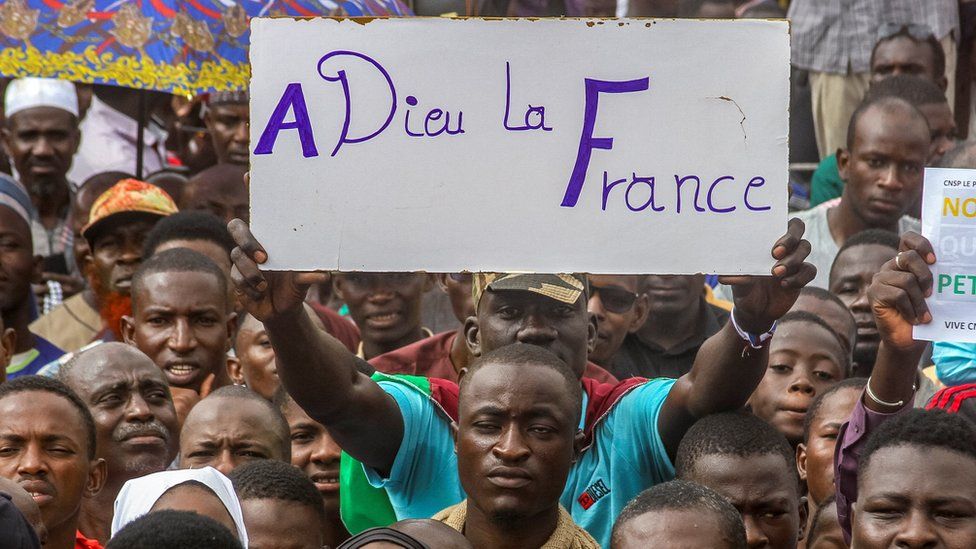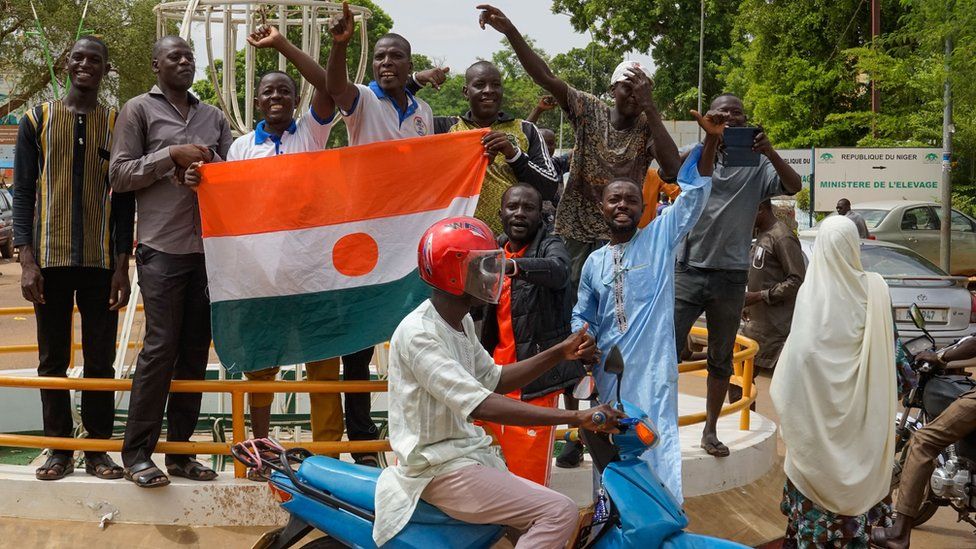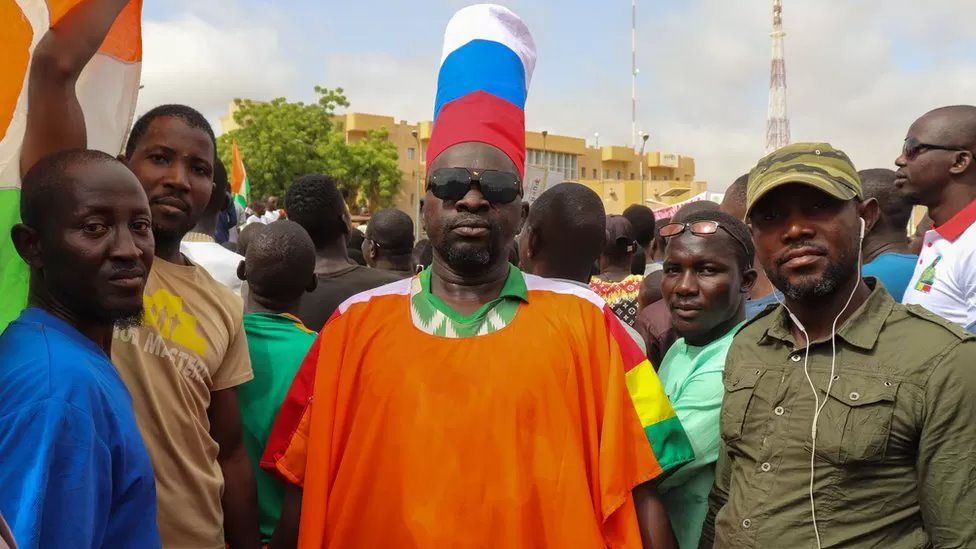风萧萧_Frank
以文会友尼日尔政变:法国应该为西非的不稳定负责吗?
https://www.bbc.com/news/world-africa-66406137
2023 年 8 月 5 日,
尼亚美游行期间,一名男子举着政变支持者举着的标语牌“再见法国”。
作者:Leonard Mbulle-Nziege 和 Nic Cheeseman
非洲分析师
尼日尔成为西非继布基纳法索、几内亚、马里和乍得(所有前法国殖民地)之后最新一个由军队夺取控制权的国家。 自 1990 年以来,撒哈拉以南非洲发生的 27 起政变中,惊人的 78% 发生在法语国家,这导致一些评论家质疑法国——或者法国殖民主义的遗产——应该受到指责吗?
许多政变策划者肯定希望我们这么认为。 2022 年 9 月被马里军政府任命为总理的阿卜杜拉耶·梅加上校对法国发起了严厉的攻击。
梅加批评“新殖民主义、居高临下、家长作风和报复性政策”,声称法国“否认普世道德价值观”,并在马里“背后捅刀子”。
布基纳法索的反法刻薄言论也十分猖獗,军政府于二月份终止了一项允许法国军队在该国开展行动的长期协议,给了法国一个月的时间撤军。
在与两国接壤的尼日尔,有关总统穆罕默德·巴祖姆是法国利益傀儡的指控被用来合法化他的下台,自那以后,阿卜杜拉赫马内·查尼将军领导的军政府撤销了与法国的五项军事协议。 部分原因是政变之后引发了民众抗议和对法国大使馆的袭击。
历史记录为这些不满提供了一些支持。 法国殖民统治建立的政治制度旨在榨取宝贵的资源,同时使用镇压策略来保持控制。
英国殖民统治也是如此,但法国在非洲的作用的独特之处在于,法国在独立后继续参与(批评者会说干预)其前领土的政治和经济。
西非九个法语国家中的七个仍然使用与欧元挂钩并由法国担保的非洲金融共同体法郎作为其货币,这是法国对其殖民地经济政策的遗产。
法国还签署了防务协议,定期代表不受欢迎的亲法领导人进行军事干预,以维持他们的权力。
尼日尔示威者还谴责政变后实施经济制裁的邻国
在许多情况下,这加强了乍得前总统伊德里斯·代比和布基纳法索前总统布莱斯·孔波雷等腐败和滥用职权人士的势力,为争取民主的斗争带来了额外的挑战。
尽管法国没有进行军事干预以恢复最近被废黜的任何国家元首的职务,但所有这些国家元首都被视为“亲法”。
更糟糕的是,法国政治领导人与其非洲盟友之间的关系常常腐败,以牺牲非洲公民的利益为代价创造了强大而富有的精英阶层。
法国著名经济学家弗朗索瓦-泽维尔·韦尔沙夫(François-Xavier Verschave)创造了“法兰西非洲”(Françafrique)一词,指的是“法国政治和经济高层的秘密犯罪行为”所隐藏的新殖民关系。 他声称,这些关系导致大量资金被“挪用”。
尽管最近几届法国政府试图与法国保持距离,但法国、法国商业利益和非洲之间的关系问题不断提醒人们,其中包括一些令人尴尬的腐败案件。
因此,很容易理解为什么一位尼日尔人告诉英国广播公司:“从童年起,我就一直反对法国……他们剥削了我国家的所有财富,例如铀、石油和黄金。”
此类丑闻常常被掩盖起来,而法国的非洲政治盟友很强大,而且法国的军事支持有助于维持稳定。
近年来,法国和其他西方国家确保秩序的能力不断恶化,越来越容易受到批评。
尽管有大量资金和军队,但法国领导的国际社会对萨赫勒地区伊斯兰叛乱的反应未能使西非各国政府重新控制其领土。
这对布基纳法索和马里文职领导人的命运尤其重要,因为他们无法保护自己的公民,给人留下了法国的支持更多是一种负担而不是一种祝福的印象。
反过来,民众日益增长的愤怒和挫败感也让军事领导人更加大胆地相信,公民会庆祝政变。
然而,尽管法国多年来在与非洲前殖民地打交道时犯了很多错误,但法语国家目前所经历的不稳定并不能完全归咎于法国。
它并不是唯一一个支持海外独裁领导人的前殖民国家。 尼日尔游行中的一群支持军事的示威者
一些反对法国介入尼日尔的人转而表示支持俄罗斯
在冷战的黑暗日子里,英国和美国帮助支持了许多独裁者以换取他们的忠诚,从肯尼亚的丹尼尔·阿拉普·莫伊到当时的扎伊尔(现在的刚果民主共和国)的蒙博托·塞塞·塞科 。
政变与前殖民国家之间的密切关系在以前的时代也不那么普遍。 自 1952 年以来发生政变次数最多的四个国家是尼日利亚(8 次)、加纳(10 次)、塞拉利昂(10 次)和苏丹(17 次),这些国家都经历过英国统治。
虽然法语国家最近的政变趋势可能反映了法非的后遗症,但西非和萨赫勒地区部分地区“前所未有”的不安全程度也支撑了这一趋势,“武装团体、暴力极端分子和 联合国表示,“犯罪网络”破坏了公众对文职政府的信心。
过去三年的每一次政变都是由一系列特定的国内因素推动的,这些因素表明了非洲政治和军事领导人的作用。
在马里,政变的背景包括2011年利比亚国家崩溃后极端主义势力涌入、总统操纵地方选举的指控以及反对党在首都策划的大规模反政府抗议活动。
尼日尔政变的导火索似乎是巴祖姆总统计划改革军事最高指挥部并罢免特基亚尼将军的职务。
这有力地表明,政变的真正目的并不是为了加强尼日尔主权或援助该国最贫穷的公民,而是为了保护军事精英的特权。
最近政变的复杂动机充分体现在许多新军政府试图用另一种外部盟友取代一种有问题的关系的速度上。
最近在圣彼得堡举行的俄罗斯-非洲峰会上,布基纳法索和马里领导人宣布支持弗拉基米尔·普京总统和入侵乌克兰。
与过去一样,这些全球联盟的受益者很可能是政治精英,而不是普通公民。 已有报道称,5月份,瓦格纳集团的部队与当时的普京政府结盟,在马里反叛乱行动中对数百名平民实施酷刑和屠杀。
因此,减少法国的影响力不太可能直接促进政治稳定,而且在未来几十年里,我们很可能会看到新一代军事领导人试图将进一步的政变合法化,因为需要使本国摆脱俄罗斯的恶意影响。
Leonard Mbulle-Nziege 是非洲风险咨询公司 (ARC) 的研究分析师,Nic Cheeseman 是伯明翰大学选举、民主、问责和代表中心的主任。
Niger coup: Is France to blame for instability in West Africa?
https://www.bbc.com/news/world-africa-66406137
 "Goodbye France," reads a placard held by supporters of the coup
"Goodbye France," reads a placard held by supporters of the coup
Niger has become the latest country in West Africa where the army has seized control, following Burkina Faso, Guinea, Mali, and Chad - all former French colonies. Since 1990, a striking 78% of the 27 coups in sub-Saharan Africa have occurred in Francophone states leading some commentators to ask whether France - or the legacy of French colonialism - is to blame?
Many of the coup plotters would certainly like us to think so. Colonel Abdoulaye Maiga, who was named prime minister by the military junta in Mali in September 2022, launched a scathing attack on France.
Criticising "neocolonialist, condescending, paternalist and vengeful policies", Mr Maiga alleged that France had "disowned universal moral values" and stabbed Mali "in the back".
Anti-French vitriol has also flourished in Burkina Faso, where the military government ended a long-standing accord that allowed French troops to operate in the country in February, giving France one month to remove its forces.
In Niger, which neighbours both countries, allegations that President Mohamed Bazoum was a puppet for French interests were used to legitimise his removal from power, and five military deals with France have since been revoked by the junta led by Gen Abdourahmane Tchiani. Partly as a result, the coup was followed by popular protests and attacks on the French embassy.
The historical record provides some support for these grievances. French colonial rule established political systems designed to extract valuable resources while using repressive strategies to retain control.
So did British colonial rule, but what was distinctive about France's role in Africa was the extent to which it continued to engage - its critics would say meddle - in the politics and economics of its former territories after independence.
Seven of the nine Francophone states in West Africa still use the CFA franc, which is pegged to the euro and guaranteed by France, as their currency, a legacy of French economic policy towards its colonies.
France also forged defence agreements that saw it regularly intervene militarily on behalf of unpopular pro-French leaders to keep them in power.

In many cases, this strengthened the hand of corrupt and abusive figures such as Chad's former President Idriss Déby and former Burkinabe President Blaise Compaoré, creating additional challenges for the struggle for democracy.
Although France did not intervene militarily to reinstate any of the recently deposed heads of state, all were seen as being "pro-French".
Worse still, the relationship between French political leaders and their allies in Africa was often corrupt, creating a powerful and wealthy elite at the expense of African citizens.
François-Xavier Verschave, a prominent French economist, coined the term Françafrique to refer to a neocolonial relationship hidden by "the secret criminality in the upper echelons of French politics and economy". These ties, he alleged, resulted in large sums of money being "misappropriated".
Although recent French governments have sought to distance themselves from Françafrique, there are constant reminders of the problematic relations between France, French business interests and Africa, including a number of embarrassing corruption cases.
It is therefore easy to understand why one Nigerien told the BBC that: "Since childhood, I've been opposed to France… They've exploited all the riches of my country such as uranium, petrol and gold."
Such scandals were often swept under the carpet while France's African political allies were strong, and France's military support helped to maintain stability.
In recent years, the ability of France and other Western states to ensure order has deteriorated, leaving them increasingly vulnerable to criticism.
Despite considerable funding and troops, the French-led international response to Islamist insurgencies in the Sahel region has failed to enable West African governments to regain control of their territories.
This was particularly significant to the fate of civilian leaders in Burkina Faso and Mali because their inability to protect their own citizens created the impression that French support was more of a liability than a blessing.
In turn, growing popular anger and frustration emboldened military leaders to believe that a coup would be celebrated by citizens.
Yet, for all of the mistakes France has made in its dealings with its former colonies in Africa over the years, the instability Francophone states are currently experiencing cannot be solely laid at its door.
It has hardly been the only former colonial power to prop up authoritarian leaders abroad. 
During the dark days of the Cold War, the UK and the United States helped prop up a number of dictators in return for their loyalty, from Daniel arap Moi in Kenya to Mobutu Sese Seko in what was then Zaire, now the Democratic Republic of Congo.
The strong relationship between coups and the former colonial power was also much less prevalent in previous eras. Four of the countries that have seen the highest number of coup attempts since 1952 are Nigeria (8), Ghana (10), Sierra Leone (10), and Sudan (17), which all experienced British rule.
While the recent trend of coups in Francophone states may reflect the legacy of Françafrique coming home to roost, it has also been underpinned by "unprecedented" levels of insecurity in parts of West Africa and the Sahel region, with "armed groups, violent extremists and criminal networks" undermining public confidence in civilian governments, according to the UN.
Each of the coups over the last three years has also been driven by a specific set of domestic factors that demonstrate the agency of African political and military leaders.
In Mali, the background to the coup included an influx of extremist forces following the the collapse of the Libyan state in 2011, allegations the president had manipulated local elections, and mass anti-government protests orchestrated by opposition parties in the capital.
The trigger for the coup in Niger appears to have been President Bazoum's plans to reform the military high command and remove Gen Tchiani from his position.
This is a strong indication that the coup was not really intended to strengthen Nigerien sovereignty, or to aid the country's poorest citizens, but rather to protect the privileges of the military elite.
The mixed motives of recent coups are well demonstrated by the speed with which many of the new military governments have sought to replace one problematic relationship with an external ally with another.
At the recent Russia-Africa summit in St. Petersburg, leaders from Burkina Faso and Mali declared their support for President Vladimir Putin and the invasion of Ukraine.
As in the past, the beneficiaries of these global alliances are likely to be the political elite rather than ordinary citizens. There are already reports that in May, troops from the Wagner group, in alliance with Putin's government at the time, were responsible for the torture and massacre of hundreds of civilians in Mali as part of anti-insurgency operations.
Reducing French influence is therefore unlikely to be a straightforward boon for political stability, and in decades to come we may well see a new generation of military leaders attempting to legitimise further coups on the basis of the need to rid their countries of malign Russian influence.
Leonard Mbulle-Nziege is a research analyst at Africa Risk Consulting (ARC) and Nic Cheeseman is the director of the Centre for Elections, Democracy, Accountability and Representation at the University of Birmingham.





